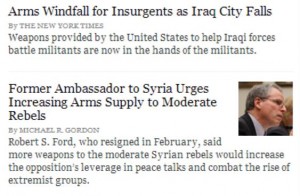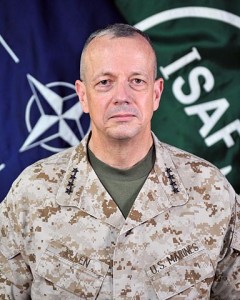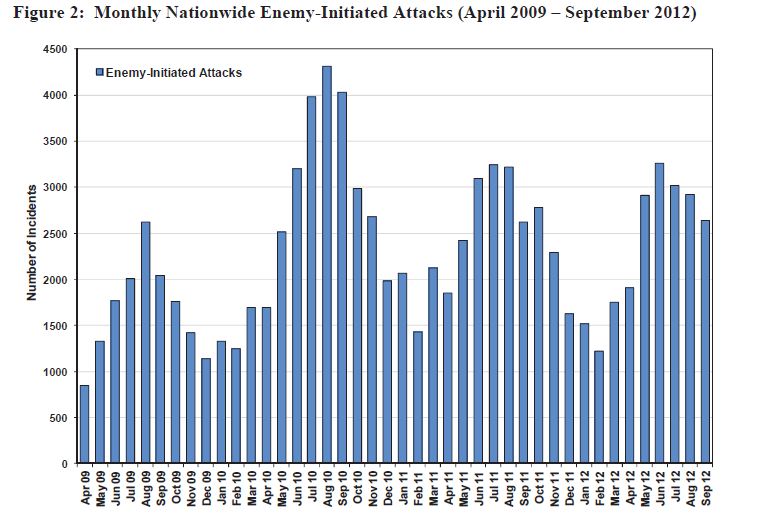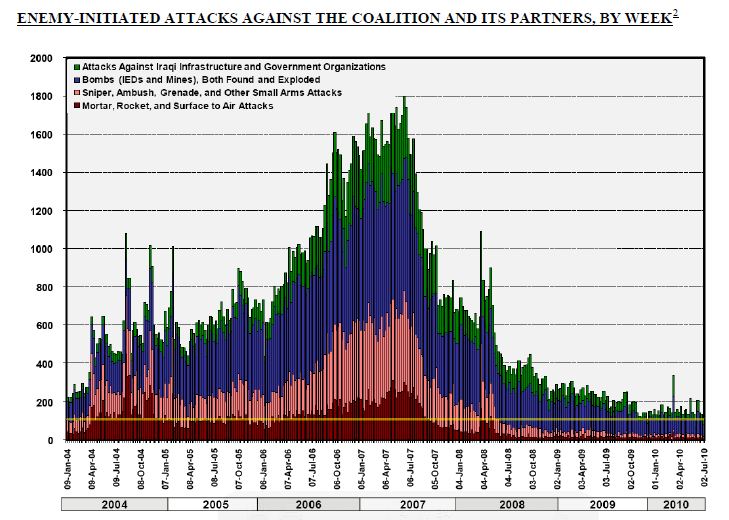Rajiv Chandrasekaran has a fascinating story about how the NeoCons–in the form of Fred and Kim Kagan–kept control of the strings on our Generals in (Chandrasekaran’s story is limited to) Afghanistan. The Kagans effectively moved to Afghanistan and served as private, high level advisors for Petraeus, all funded by the defense contractors funding AEI and Institute for the Study of War.
The four-star general made the Kagans de facto senior advisers, a status that afforded them numerous private meetings in his office, priority travel across the war zone and the ability to read highly secretive transcripts of intercepted Taliban communications, according to current and former senior U.S. military and civilian officials who served in the headquarters at the time.
The Kagans used those privileges to advocate substantive changes in the U.S. war plan, including a harder-edged approach than some U.S. officers advocated in combating the Haqqani network, a Taliban faction in eastern Afghanistan, the officials said.
The pro-bono relationship, which is now being scrutinized by military lawyers, yielded valuable benefits for the general and the couple. The Kagans’ proximity to Petraeus, the country’s most-famous living general, provided an incentive for defense contractors to contribute to Kim Kagan’s think tank. For Petraeus, embracing two respected national security analysts in GOP circles helped to shore up support for the war among Republican leaders on Capitol Hill. [my emphasis]
Perhaps more frightening than that is the way the Kagans threatened Stanley McChrystal to be allowed to check his work in Afghanistan.
The Kagans should have been thrilled, but they soon grew concerned. They thought McChrystal’s headquarters was not providing enough information to them about the state of the war. The military began to slow-roll their requests to visit Afghanistan. In early 2010, they wrote an e-mail to McChrystal, copying Petraeus, that said they “were coming to the conclusion that the campaign was off track and that it was not going to be successful,” Fred Kagan said.
To some senior staff members in McChrystal’s headquarters, the e-mail read like a threat: Invite us to visit or we will publish a piece saying the war is lost.
Worried about the consequences of losing the Kagans, McChrystal authorized the trip, according to the staff members.
The story notes that John Allen has afforded them access as well.
So effectively, Neocons who have repeatedly led the cry to escalate our wars have been given personal access to the war, paid for by the people profiting off these escalations.
As fascinating as the story is, it doesn’t yet tell the full narrative of what the Kagans were doing.
For example, why is Chandrasekaran just reporting it now? Has David Petraeus’ star fallen sufficiently for sources to start revealing what was apparent to all of us watching, he was a NeoCon puppet? Or is it surfacing because of the review by military lawyers, bolded above?
Or is it coming to light now because of the close scrutiny Petraeus’ communications and actions received after he was caught diddling his biographer? Chandrasekaran’s sources claim the people running the war didn’t know Neocon advisors were camped out with SCI clearances reading Taliban intercepts (hey! didn’t we try to make peace with the Taliban?!?!).
The extent of the couple’s involvement in Petraeus’s headquarters was not known to senior White House and Pentagon officials involved in war policy, two of those officials said.
So if they just discovered it after the Paula Broadwell affair, it would make sense that it is now leaking.
Then there’s a temporal feint Petraeus’ allies are trying to pull off. A former aide suggests Petraeus brought the Kagans in simply because he had less knowledge of Afghanistan than he had in Iraq.
“Petraeus relied on the Kagans for a fresh set of eyes . . . because he didn’t have the same nuanced understanding of Afghanistan that he had of Iraq,” a former aide to Petraeus said.
That is, Petraeus wants to suggest this arrangement existed only in Afghanistan (not insignificantly, the period of time when Petraeus’ communications would be under review because of the Broadwell scandal).
But Chandrasekaran makes it clear it goes back further. Petraeus started providing Neocons access back in Iraq, and he did so, in part, because they served as publicists for the publicity hound General.
The Defense Department permits independent analysts to observe combat operations, but the practice became far more common when Petraeus became the top commander in Iraq. He has said that conversations with outside specialists helped to shape his strategic thinking.
The take-home benefit was equally significant: When the opinion makers returned home, they inevitably wrote op-eds, gave speeches and testified before Congress, generally imparting a favorable message about progress under Petraeus, all of which helped him sell the war effort and expand his popularity. [my emphasis]
These think tankers, funded by defense contractors, were selling Petraeus right along with their escalating wars.
Besides, we know Fred Kagan, at least, was getting this kind of access during Iraq and using it to sell the escalation. As I noted in 2008, the back channel between Dick Cheney–who after being instructed by the Saudis, was pushing the surge–and Petraeus through Jack Keane is the untold story of the official narrative of Iraq.
And then there’s the curious near-total absence of Dick Cheney from the first three-fifths of the book, the part describing the debates over a new strategy in Iraq, even while Woodward admits Cheney continued to “offer[] his views directly to the president.” Cheney’s absence is particularly problematic given the reports that Saudi Arabia’s King Abdullah “summoned Cheney” to Riyadh to express displeasure (andissue threats) about the Iraq Survey Group’s proposals just before the time when–Woodward reports–Bush made up his mind to support a troop escalation.
According to Hadley, that moment [when Bush decided in favor of a surge] had come when the president called him in mid-December 2006 and said, “I’m getting comfortable with my decision, but I don’t want to give a speech yet.”
Particularly given Woodward’s portrayal of the way Cheney later fiercely guards his back channel access through Jack Keane to David Petraeus–breaking the chain of command to protect the surge from all regional considerations–the description of Cheney as distanced from the decision to support the surge seems odd.
Woodward made it clear, though, that AEI (that is, Kagan) was getting classified information to build his theory of the surge.
So this puppet mastery is in no way new to Afghanistan. It’s just that the Afghan story is coming out, without yet being connected to the escalation that still remains the fictional success story orchestrated by the heroic General Petraeus and his merry band of think tanker-publicists.
And aside from my point above–that their access to Taliban intercepts means the Kagans would have had a view on any peace negotiations–there’s Chandrasekaran subtle suggestion that the Kagans dictated the surge in Afghanistan, too, advocating for the targeting of the Haqqani network at a time when President Obama was trying to reel in the war.
Their immersion occurred at an opportune time. Petraeus was fond of speaking about the importance of using troops to protect Afghan communities from insurgents, but he recognized that summer that the Obama White House wanted to narrow the scope of the war. As a consequence, the general decided to emphasize attacking insurgent strongholds — and so did the Kagans.
[snip]
The Kagans believed U.S. commanders needed to shift their focus from protecting key towns and cities to striking Haqqani encampments and smuggling routes, according to several current and former military and civilian officials familiar the issue.
In the late summer of 2010, they shared their views with field officers during a trip to the east. “They implied to brigade commanders that Petraeus would prefer them to devote their resources to killing Haqqanis,” said Doug Ollivant, a former senior adviser to the two-star general in charge of eastern Afghanistan.
But Petraeus had not yet issued new directives to his three-star subordinate or the two-star in the east.
The suggestion is the Kagans drove the new focus on the Haqqanis–indeed, were even issuing orders to officers before Petraeus was doing–just at the time Obama was trying to de-escalate the war.
The implications of this story are quite sobering, though Chandrasekaran has just begun to map it all out. Paid representatives of the war industry twice intervened with David Petraeus to get him to extend and expand the war. And in the case of Afghanistan (and I suspect even in the case of Iraq) they did so by bypassing the entire chain of command.




